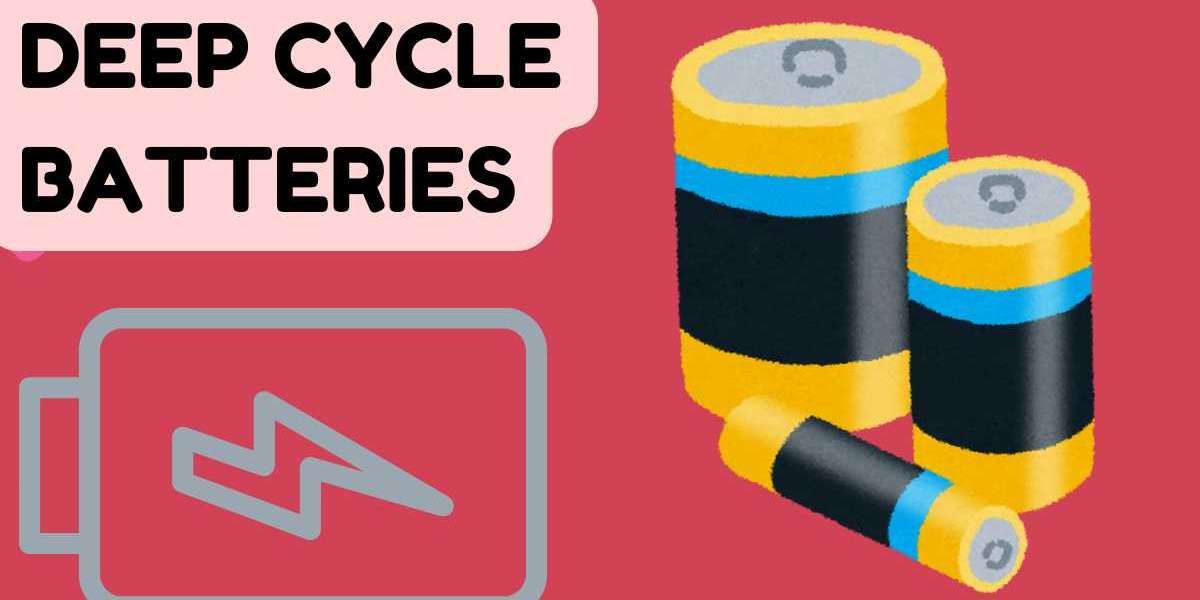Deep cycle batteries are vital for a wide range of applications, from solar power systems to recreational vehicles. These batteries differ significantly from conventional car batteries, primarily due to their design and functionality. This comprehensive guide will delve into the various aspects of deep cycle batteries, including their types, benefits, maintenance, and practical uses. Whether you’re looking to upgrade your battery system or just seeking more information, this guide will provide you with the essential knowledge you need.
What Are Deep Cycle Batteries?
Deep cycle batteries are designed to be discharged and recharged multiple times, making them ideal for applications where a steady amount of power is needed over an extended period. Unlike starting batteries, which deliver short bursts of high power, deep cycle batteries provide a consistent voltage and can handle a deeper discharge.
These batteries are commonly used in:
- Solar power systems: To store energy generated by solar panels.
- Electric vehicles: Including golf carts and mobility scooters.
- Marine applications: To power boats and other watercraft.
- Recreational vehicles (RVs): To supply power for camping and off-grid living.
Types of Deep Cycle Batteries
There are several types of deep cycle batteries, each with unique features and advantages:
Lead-Acid Batteries: The most common type, lead-acid batteries come in two main subtypes: flooded and sealed. Flooded lead-acid batteries are affordable and robust but require regular maintenance. Sealed lead-acid batteries, such as absorbed glass mat (AGM) and gel batteries, are maintenance-free and better suited for applications where battery orientation might vary.
Lithium-Ion Batteries: Known for their high energy density and lightweight nature, lithium-ion batteries are gaining popularity in various applications. They offer longer lifespan, faster charging times, and are more efficient compared to lead-acid batteries. However, they tend to be more expensive.
Gel Batteries: A subtype of sealed lead-acid batteries, gel batteries use a silica-based gel electrolyte. They are highly resistant to vibration and extreme temperatures, making them suitable for harsh environments.
AGM Batteries: Absorbed Glass Mat (AGM) batteries are another type of sealed lead-acid battery. They are known for their durability, low maintenance, and ability to provide high discharge currents. AGM batteries are commonly used in automotive and marine applications.
Benefits of Using Deep Cycle Batteries
Durability: Deep cycle batteries are built to withstand repeated charge and discharge cycles. This durability ensures a longer lifespan, making them a cost-effective choice in the long run.
Consistent Power Supply: Unlike starting batteries that provide a burst of power, deep cycle batteries offer a steady and reliable power output. This feature is particularly useful in applications requiring continuous energy supply.
Efficiency: Deep cycle batteries can efficiently store and use energy, especially in renewable energy systems like solar panels. They enable the storage of excess energy for use during periods without sunlight.
Low Maintenance: Many modern deep cycle batteries, especially sealed varieties, require minimal maintenance. This ease of use makes them a convenient choice for various applications.
Choosing the Right Deep Cycle Battery
When selecting a deep cycle battery, consider the following factors:
Capacity: Measured in ampere-hours (Ah), the battery's capacity should match the power requirements of your application. Higher capacity batteries can store more energy and provide longer usage periods.
Voltage: Ensure the battery voltage matches the requirements of your system. Common voltages for deep cycle batteries are 12V, 24V, and 48V.
Size and Weight: The physical dimensions and weight of the battery should fit the available space in your setup. Consider the battery's placement and how it will impact your overall system.
Budget: Deep cycle batteries vary widely in price. While more expensive batteries like lithium-ion offer better performance and longevity, budget-friendly options like lead-acid batteries might be sufficient for less demanding applications.
Maintenance Tips for Deep Cycle Batteries
Proper maintenance is essential to ensure the longevity and performance of your deep cycle batteries:
Regular Charging: Avoid deep discharges by keeping your battery charged. Most deep cycle batteries should not be discharged below 20% of their total capacity.
Clean Terminals: Keep the battery terminals clean and free from corrosion. Corrosion can impede performance and reduce the battery's lifespan.
Check Electrolyte Levels: For flooded lead-acid batteries, regularly check and top up the electrolyte levels with distilled water as needed.
Inspect for Damage: Periodically inspect your deep cycle batteries for any signs of damage or leaks. Address any issues promptly to prevent further damage.
Store Properly: If you need to store your battery for an extended period, keep it in a cool, dry place and ensure it is fully charged.
Applications of Deep Cycle Batteries
Deep cycle batteries find applications in various fields:
Solar Power Systems: In solar energy setups, deep cycle batteries store energy collected from solar panels. This stored energy can then be used to power your home or other devices when sunlight is not available.
Electric Vehicles: Golf carts, mobility scooters, and electric bikes often use deep cycle batteries. These batteries provide the consistent power needed to operate electric motors efficiently.
Marine Use: Boaters rely on deep cycle batteries to power navigation systems, lights, and other onboard equipment. Their durability and resistance to vibrations make them ideal for marine environments.
Recreational Vehicles (RVs): RV owners use deep cycle batteries to power lights, appliances, and other devices while camping or traveling. These batteries enable a more comfortable and self-sufficient travel experience.
Conclusion
Deep cycle batteries are an essential component for various energy storage needs. Their ability to deliver consistent power over extended periods makes them ideal for applications ranging from solar power systems to recreational vehicles. By understanding the different types, benefits, and maintenance requirements, you can make an informed decision and ensure that your deep cycle batteries perform optimally for years to come.








